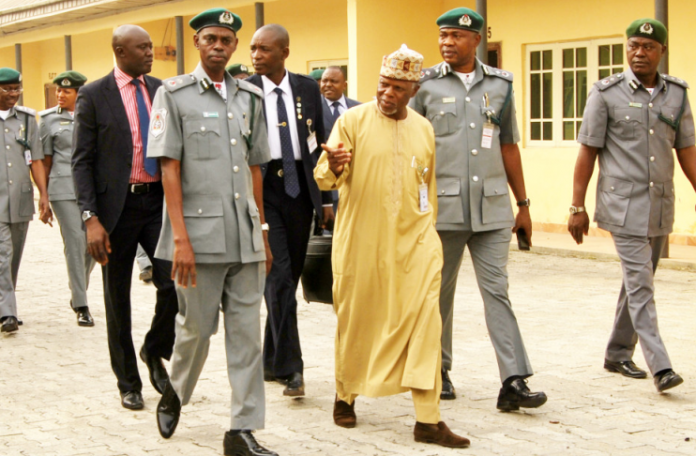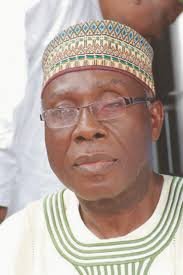Colonel Hammed Ali in Customs Uniform Would be an Illegality – Mallam Abdulkadir Isa
There is a way in which Colonel Hammed Ali (retd)’s entanglement in controversy now is a bit surprising. He can be described as a controversy tested warrior. But he seemed to have outgrown controversy into the club of the few individuals who exercise oversight on the society when he joined the Sunday Awoniyis, Adamu Fika and MD Yusuf to produce an ACF leadership recruitment primer some years back. So, his current slip into controversy came as a surprise.
Speculated to be heading for appointment as the Chief of Staff in the then impending Buhari cabinet in 2015, Col Ali ended up as Comptroller-General of the Nigeria Customs Service. Since he eventually landed there, he has never been seen in the uniform of the service. Is it an infraction or a non-issue? Is the Senate raising a major issue or fighting shadow wars against a perceived one man mafia? Or, is Ali’s action a consideration of what the society cannot even fathom? What might he have been doing correctly or wrongly in the Customs?

Mallam Abdulkadir Isa
These questions found no better person to respond to them than Mallam Abdulkadir Isa, the last president of the now de-registered Customs and Immigration Staff Union. All the four key unionists with whom they fought for union space with the support of late Paschal Bafyau lost out. That was not his first taste of rebellion. It came earlier in 1964 when had the audacity to write NEPU on his cap while in Primary 3. It fetched him eight lashes on the buttocks. Subsequent attempts to cow him didn’t work, what with the Gani Fawehinmi Chambers intervening to undo an attempt to expel him and others from the Kaduna Polytechnic in 1979. That was before he ended up at the Institute of Administration, ABU, Zaria. Today, he is a highly regarded retiree from the Immigration Service. He obliged Intervention an insider’s perspective.
Failing to wear the service uniform is one of the entertaining aspects of the on-going encounter between Col Hammed Ali and the Senate. Is there a vital point there?
None. I say so not as a supporter or antagonist of Colonel Ali but because the law does not support it. At over 60 years in age, he cannot wear the uniform any longer because he is past the age. A CG of the NCS cannot be over 60 years in age. The CG is not part of the cabinet. NCS is a department under a ministry, meaning that the CG is a civil servant under a minister who is a political appointee. It cannot be headed by a retiree because a retiree cannot be paid from the public treasury because he is already a pensioner. He can only be paid allowances. I thought this was what the Senate wanted to raise.
We are told the president can make anybody CG of NCS
Yes because the Customs Act allows him or her to do so but the person so appointed cannot be above 60. If the president goes outside of the NCS, then that person can only come as a Sole Administrator. The Fifth Schedule of the Constitution, Section 4, sub-section 2 does not allow Ali to wear uniform twice or be remunerated twice. That’s why I thought the Senate wanted to ask if he is being paid twice. Now, they are talking about uniform. Customs is an institution of the Executive arm and the occupant of that office cannot be policed by the Senate on procedural issues.
So, what happens now?
He said something like he is consulting for legal advice on the issue. That looks unnecessary to me. The neatest response to all these is re-designate him as Sole Administrator and nobody has to worry about some of these procedural issues.
Won’t Sole Administrator title make people allege anti-democratic tendency?
Appointments as this are bound to happen at some point depending on what the president got to know about the state of the department at the time he made the appointment. What I think is important is for all of us to take note of the contradictions.
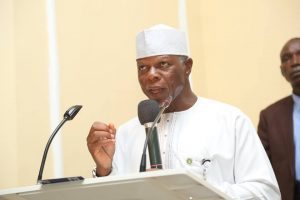
Col Hammed Ali, (retd)
What would you say about how he has run the NCS so far?
There is the issue over which the Senate invited him. That is a major issue. Unfortunately, that has been swallowed by the issue of uniform. The CG is talking of payment of duties on vehicles that have already been brought into the country. That is both a financial and a security issue. If you are going to enforce collection of the duties within the country, then you are telling the whole world that the duties were not collected at the point of entry. It means that the vehicles were smuggled. So, if you catch a smuggled vehicle, all you do is to collect duty on them and let go? So, the CG might be doing a great job if he were to succeed in collecting the duties but he would also be indicating how weak the service is in terms of dealing with smuggling of such types of vehicles. That shows a beaten service, a service that is not proficient. That’s the implication. And the questions he should also have been asking along the policy are questions of what sort of vehicles are most involved; how much the nation losing; how long ago did it reach that magnitude and so on.
Is it not with the closure of land borders that this arose?
No, no, no. It is not. It is not all the borders that were closed anyway. And even if that happens to be the case, the sea and the airports are there. Were they also closed? We can talk about how great globalisation is but the system should design a better way of managing or ensuring that duty on all imported goods are collected at the point of entry – sea, land or airports. It doesn’t speak well of a nation that cannot do this, globalisation or no globalisation.
A porous border is the standard refrain when the question of this nature is up in Nigeria. Do you connect this to that?
I accept that the borders are expansive, contiguous and porous and we lack the technology and the manpower. I am not sure Customs Service has more than a hundred service men and women. That would obviously not be adequate but the other side of it is that if the problem is not compounded by porous hands too. It could be that the borders are porous because there also porous hands. That aspect has to be brought in too. It is not enough to say there are porous borders. Second, what is the information sharing arrangement within and without the Nigerian system? How are we linking up with other ports and border controls? What sort of partnerships do we have?
When we are talking of the Customs Service, we are automatically talking of Immigration where you belonged. Customs deals with goods, Immigration deals with people. Both come through borders that are porous. How is Immigration faring?
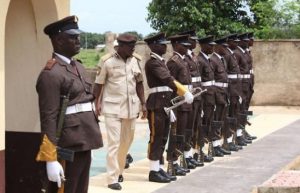
Equipped to cope with globalisation?
I would say basically the same problems of manpower, technology and the nature of the borders except to add that there is a problem peculiar to Immigration, one gap in our system. The post colonial orientation of our system for managing Immigration is such that it was only interested in controlling people coming in from the point of view of capture of market and labour. If you were from the Commonwealth, you were not an alien, unless it has been changed recently. You are an alien only if you are from the US, the old Soviet Union and so on. As such, it did not respond to the peasant nature of immigration. When I say peasant nature, I have in mind a category of immigrants we do not have the mechanism to respond to. When you talk of immigration now, you are talking of tourists, workers, people seeking medical attention, students and investors. These ones you can capture through the system of documentation. What of the labourers and traders who arrive today, report himself or themselves to the village head or the local chief and mix into the crowd before long? After some time, they can move from Kano to Portharcourt or Lagos to Kaduna or wherever. How do you monitor their movements? You have no way of even knowing their citizenship status. It probably didn’t matter but things are changing.
Now, closely tied to that is how the ECOWAS system has complicated Immigration system for us, especially the citizenship aspect. You cannot expect an ECOWAS citizen to stay in Nigeria for so long and not get married to a Nigerian. Now, their children are automatically Nigerian citizens because the Constitution says you are a citizen once one of your parents is a Nigerian by birth. That is why Shugaba Darman’s mother went to the court to testify that the man was a Nigerian and the court granted it. If you go to Maiduguri now, you find many Chadians married to Nigerians. In Lagos area, in Badagry, Idiroko, Calabar and many places around the country, this is quite common. You cannot know the citizen who can become a nation’s saving grace tomorrow. So, everyone is important. But what does Nigeria do today should an ECOWAS citizen married to a Nigerian woman decides that he doesn’t want his child or even children to be Nigerians even though the Constitution says they are? Nigeria cannot protest because there is no law backing his or citizenship beyond what is in the Constitution. Are we then doomed to be losing citizens? One day soon, you are bound to have a sensational case. So, the ECOWAS system has impacted on the pattern of citizenship.
What broad suggestion do you have for these services which have become the problem theatres of globalisation and its contradictions?
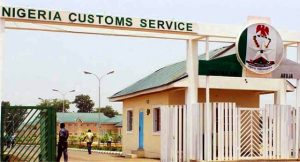 Correct! Globalisation has put services like Customs and Immigration in difficult challenges. The question is how well have we prepared these services for these challenges in Nigeria? Like the military, these are not places just for people to collect monthly salaries. High degree of patriotism is required. High degree of training is required to see through the contradictions you mentioned. Have we done that? Are these places such that the temptations to accept inducement have been closed? I talked about the connection between porous hands and porous borders earlier on. It is not to just punish if caught, it is also about re-orientation because the job leaves room for discretion. The rules are there but the room for discretion also exists. However, a simple mistake, genuine or deliberate, by an individual at the port or border post, can have ripple effects on safety and public order. So, we should be interested in how these services have been prepared for the challenges. What is their collaborative paradigm or are they lost in the competition for attention that people have observed among the agencies? In my view, these are areas the services as well as the public needs to reflect upon.
Correct! Globalisation has put services like Customs and Immigration in difficult challenges. The question is how well have we prepared these services for these challenges in Nigeria? Like the military, these are not places just for people to collect monthly salaries. High degree of patriotism is required. High degree of training is required to see through the contradictions you mentioned. Have we done that? Are these places such that the temptations to accept inducement have been closed? I talked about the connection between porous hands and porous borders earlier on. It is not to just punish if caught, it is also about re-orientation because the job leaves room for discretion. The rules are there but the room for discretion also exists. However, a simple mistake, genuine or deliberate, by an individual at the port or border post, can have ripple effects on safety and public order. So, we should be interested in how these services have been prepared for the challenges. What is their collaborative paradigm or are they lost in the competition for attention that people have observed among the agencies? In my view, these are areas the services as well as the public needs to reflect upon.

